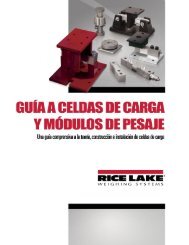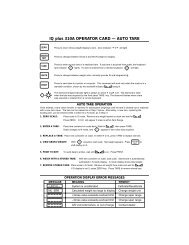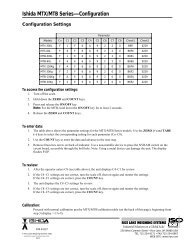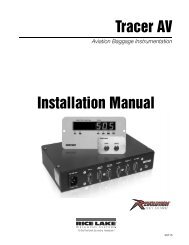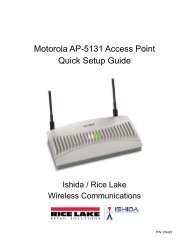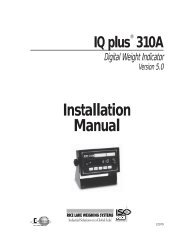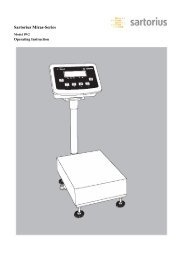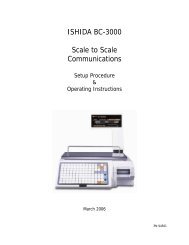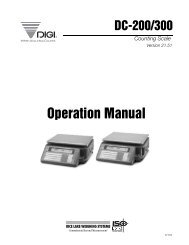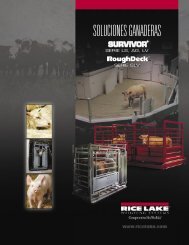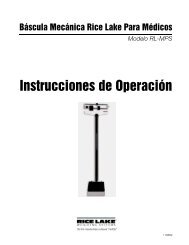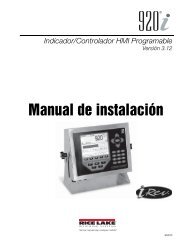Create successful ePaper yourself
Turn your PDF publications into a flip-book with our unique Google optimized e-Paper software.
A magazine and REFERENCE TOOL FOR THE WEIGHING INDUSTRY / Summer 2011 • issue 1 • vol. 8
This issue<br />
Editorial Staff<br />
Carol Ailes, Technical Writer<br />
Mobile technology is sweeping the world.<br />
Handheld devices like smartphones are playing a wider,<br />
and very soon indispensable, role in everyday life.<br />
<strong>Rice</strong> <strong>Lake</strong> is ahead of the curve. Now our catalogs, technical manuals, literature,<br />
and part numbers are available on phones, tablets, laptops, and desktops.<br />
We’re looking for the next innovation to make <strong>Rice</strong> <strong>Lake</strong> information even handier.<br />
For example, see the cube at the right? It’s called a<br />
Quick Response, or QR code—a unique matrix barcode<br />
readable by QR barcode readers and camera phones.<br />
To try it, scan the QR with your smartphone—you’ll<br />
go straight to m.ricelake.com—the mobile version of<br />
our website.<br />
There, you can even access this <strong>Rice</strong> <strong>Lake</strong> magazine. It is<br />
packed cover-to-cover with interesting scale applications<br />
in weighing and process control. You’ll find information<br />
SCAN IT<br />
about wireless technology including the differences<br />
between Bluetooth®, ZigBee® and Wi-Fi. We also visit <strong>Rice</strong> <strong>Lake</strong> equipment applications<br />
at a commercial bakery, a manufacturer of car racks for sports equipment, a busy stone<br />
quarry, and a facility that performs force testing on airplane wings.<br />
Whether online or printed we hope you enjoy this issue. Then, feel free to take a moment<br />
to use any of today’s innovative forms of technology to tell us what you think. Call,<br />
email, or post a note on our Facebook page at<br />
facebook.com/ricelakeweighingsystems.<br />
We enjoy hearing from you.<br />
Melanie Al Faraj, Technical Writer<br />
Tamala Anderson, Designer<br />
Cheryl Aune, Literature Manager<br />
Bob Chatten, Translator<br />
Matt Davis, Marketing Specialist<br />
Jessica de la Cruz, Writer<br />
Melissa Hjelle, Marketing Specialist<br />
Katy Madden, Senior Editor<br />
Kelly Musil, Catalog Manager<br />
Caleb Olson, Technical Writer, Reporter<br />
Pat Ranfranz, Marketing Director<br />
Hannah Rechsteiner, Designer<br />
Adam Sharpe, Web Master<br />
Tina Slayton, Marketing Specialist<br />
Kevin Theese, Marketing Support<br />
Stacy White, Marketing Specialist<br />
Kristina Zengaffinen, Senior Designer<br />
Pat Ranfranz<br />
Director of Marketing<br />
Pat is a private pilot . He has spent years<br />
searching the Pacific for missing WWII<br />
American air crews—one including his uncle.<br />
2 RICE LAKE MAGAZINE | www.ricelake.com
this issue<br />
RICE LAKE MAGAZINE • Summer 2011 • Issue 1 • Vol. 8<br />
Inside<br />
page 4 What’s New 920i ® FlexWeigh <strong>Systems</strong>, 720i Advanced Truck Mode, Lift truck test<br />
weight, RailBoss rail scale, and RS-232 to USB Smart Cable. page 6 Raising the Dough<br />
How a single inventor fabricated a batching system for bakeries and burglars burgled the prototype.<br />
page 9 Give Your Balance a Brain Using the 920i as a serial scale control adds<br />
intelligence to precision weighing. page 10 Search for the Missing Part<br />
6<br />
Thule makes sure all the parts are in the box of auto racks for sporting equipment.<br />
page 13 Smoothing the Road Chrysler uses four pit-style RoughDecks ®<br />
to checkweigh automobile center of gravity. page 14 Wing Walking the 920i<br />
Stress-testing airplane wings with analog load cells disguised as digital load cells.<br />
page 18 Time Flies at Tilcon Automated Ticketing <strong>Systems</strong> cut the chit-chat and<br />
increase rock quarry throughput. page 22 Blowin’ in the Wind A comparison of<br />
Bluetooth ® , ZigBee ® and Wi-Fi wireless technology.<br />
10<br />
RICE LAKE MAGAZINE<br />
Online<br />
Going green? Access the <strong>Rice</strong> <strong>Lake</strong> magazine online.<br />
You will enjoy the same great stories plus links to more<br />
information. Also, with electronic access, you can easily<br />
share articles with employees and customers.<br />
To Subscribe<br />
Go to www.ricelake.com/ricelakemagazine<br />
and complete the online form. It’s that easy.<br />
If you have any questions, please email us at<br />
rlmagazine@ricelake.com.<br />
Find us on Facebook:<br />
www.facebook.com/<br />
ricelakeweighingsystems<br />
14<br />
www.ricelake.com | RICE LAKE MAGAZINE 3
WHAT’S NEW<br />
From Off-the-shelf<br />
to ready-to-weigh<br />
920i ® FlexWeigh <strong>Systems</strong><br />
Process Control<br />
Pre-engineered and programmed, 920i<br />
FlexWeigh <strong>Systems</strong> are <strong>Rice</strong> <strong>Lake</strong>’s turnkey<br />
solution to manufacturers’ most commonly<br />
used weighing processes. No need<br />
for lengthy quoting and design. Each 920i<br />
FlexWeigh <strong>Systems</strong> model is a standard<br />
design, factory tested and programmed for<br />
your specific task—yet customizable to allow<br />
you to do it your way. For more information<br />
visit ricelake.com/920iflexweigh. ▪<br />
The 720i you need for truck<br />
scale enterprises<br />
720i Programmable Indicator with<br />
Advanced Truck Mode (ATM)<br />
Advanced Truck Mode offers more data storage<br />
and reporting capabilities. Ramped-up memory<br />
capacity stores up to 99 unique customers,<br />
material, or source files and 1400+ transaction<br />
files. With ATM, the 720i programmable indicator<br />
can provide a wide range of useful reports—by shift, customer, material and a summary<br />
of the day or entire data range. See a demonstration at ricelake.com/webinars.<br />
▪<br />
Check lift truck<br />
scale accuracy without<br />
dismounting the<br />
lift truck<br />
Lift Truck Test Weight<br />
Operators stay safely in the lift truck<br />
cab. No hooks, chains or spreader bars<br />
to adjust, and accuracy verification is<br />
fast and easy. Drive in, lift, set down,<br />
and back to work.<br />
Designed for pancake cargo scales<br />
and fork truck scales. Mild steel<br />
painted weight. ASTM Class 6 tolerance.<br />
1000- and 2000-lb weight. For<br />
more information visit ricelake.com/<br />
ltweight. ▪<br />
4 RICE LAKE MAGAZINE | www.ricelake.com
WHAT’S NEW<br />
plug in this cable<br />
and connect serial devices<br />
to your PC or Mac<br />
RS-232 to USB Smart Cable<br />
Scales, balances, RFID or barcode readers<br />
can be connected, allowing the operator<br />
to instantly see output on screen.<br />
No software or driver installation required.<br />
The Smart Cable draws power from the<br />
USB port, requiring no external power<br />
supply. Windows® 7 no longer has a free<br />
HyperTerminal. With the Smart Cable, you<br />
can test RS-232 and be sure data<br />
is outputting. For more information visit<br />
ricelake.com/smartcable. ▪<br />
Wish you could weigh railcars<br />
before they leave your yard?<br />
RailBoss Rail Scale fits in your yard and your budget<br />
Many scrap yards, agricultural operations and plants that could never afford the<br />
installation downtime and cost of a conventional rail scale can afford to install<br />
RailBoss. It usually takes less than eight hours to install and is one-third the cost<br />
of conventional rail scales.<br />
The system is a series of 5'10" rail sections fitted with strain gauges. Each rail<br />
section is a weighbridge for a single wheel. The system provides total car weight<br />
plus individual truck weight. (Not Legal-for-Trade) For more information visit<br />
ricelake.com/railboss. ▪<br />
Unplug<br />
Are you hardwired to RS-232?<br />
“The scale industry is hardwired to RS-232,” Ann<br />
Crowley, <strong>Rice</strong> <strong>Lake</strong> product manager, holds up<br />
one of many cables snaking off her desk. They<br />
often overlook using Ethernet® to send data from<br />
the production line to their office.<br />
“We recently had a request from a MotoWeigh®<br />
customer. They wanted a printer to carry around<br />
occasionally to print data from the production<br />
line.” Ann suggested they use a printer with<br />
Ethernet capabilities. “They can print out their<br />
reports to the printer in the office as needed and<br />
they don’t have to carry around a printer.”<br />
The customer needed a small footprint and wide<br />
printout. The TSP800 Star printer with Ethernet<br />
option filled the bill. ▪<br />
www.ricelake.com | RICE LAKE MAGAZINE 5
on location<br />
John Imparato, the proud and colorful owner of Giannella<br />
Modern Baking Company in Paterson, New Jersey, has one of those<br />
“bigger-than-life” personalities that makes meeting him an unforgettable experience.<br />
His bakery is famous for authentic Old World breads baked from recipes handed<br />
down through his family—recipes John wants kept secret.<br />
Marcelo Tise, engineer, inventor, and owner of Advanced Automation, Riverdale, N.J., had experience working with bakery equipment and<br />
knew what needed improving at Giannella. The result is a minor-ingredient batching system geared toward the baking industry and named<br />
6 RICE LAKE MAGAZINE | www.ricelake.com
on location<br />
the Batch Process Analysis (BPA) system,<br />
all designed, fabricated and installed<br />
by Advanced Automation in Riverdale.<br />
With BPA’s modular design, Marcelo and<br />
his team can design and build systems with<br />
as many ingredient hoppers as needed, and<br />
write all the software needed as well.<br />
The BPA also allows bakeries to tweak<br />
recipes for maximum cost savings. For<br />
instance, if a recipe calls for five pounds of<br />
sugar, a bakery could leave out one ounce<br />
of sugar from each batch. The end product<br />
will be consistent from batch to batch,<br />
and the BPA allows a bakery’s recipes to<br />
remain secret under password protection.<br />
The BPA has a very small footprint,<br />
taking no more room than the work<br />
benches used today. The system also<br />
allows bakeries to track all minor ingredients<br />
without having to put pen to<br />
paper. Giannella uses eight IQ plus® 355<br />
weight indicators and one 820i® weight<br />
indicator. The IQ plus 355 indicators<br />
have analog outputs that the PC reads.<br />
It is used to monitor the weight in any<br />
one of eight feed hoppers that are filled<br />
with micro ingredients for commercial<br />
baking. The PC stores the many familysecret<br />
formulas. The operator can select<br />
the formula he or she wants. The 820i<br />
indexes a moving bench scale under the<br />
feed hoppers. As the hoppers get low<br />
on product, a signal is sent to the batch<br />
master who manually re-loads. Software<br />
automatically tracks and records daily<br />
production runs, allowing bakeries to<br />
adhere to strict standards demanded by<br />
quality regulation associations.<br />
Through the BPA’s touchscreen system,<br />
workers can select the recipe and the total<br />
batch count and hit “run.” The BPA will<br />
measure the ingredients into a tray, with<br />
accuracy down to the ounce, eliminating<br />
waste of expensive minor ingredients.<br />
It took Marcelo about a year and a half<br />
to develop the BPA, from conception<br />
to programming to manufacturing. The<br />
machine and software system conforms<br />
to, and in some instances surpasses, all<br />
mandatory ingredient traceability and<br />
handling standards.<br />
Continued on page 8<br />
“I can’t control the prices of my ingredients, but I can control how much I use.<br />
BPA was the answer. Since installing BPA we increased our yield, tracked our use,<br />
and traced raw products via lot numbers down to the batch number.<br />
No more writing down lot numbers or errors in my batch. Our operators just<br />
select the recipe, select the mixer to use, and start the batch.”<br />
John Imparato, president of Giannella Modern Baking Company, Paterson, N.J.<br />
John demonstrates the old way—when bakers measured<br />
ingredients by eye and instinct, with a pinch of<br />
this and a scoop of that. He scoops and pinches ever<br />
more expensive ingredients like sugar and flour out<br />
of a barrel before weighing them on a baker’s scale.<br />
This inevitably results in waste and spillage.<br />
With BPA’s modular design, Marcelo and his team can design and build systems with as many<br />
ingredient hoppers as needed. The eight-silo BPA, 10 feet tall and 8 feet wide, stands in the back corner<br />
of Giannella’s, turning out perfect batches every time.<br />
www.ricelake.com | RICE LAKE MAGAZINE 7
on location<br />
Angela recalls,<br />
“We were floating<br />
on air— until we went<br />
outside to the parking<br />
lot; the trailer with the<br />
prototype inside<br />
was gone!”<br />
Center: Marcelo Tise, and left: Angela Falzarano<br />
Raising the Dough continued from page 7<br />
What trailer?<br />
the Advanced Automation team showed<br />
their first BPA prototype at the International<br />
Baking Industry Exposition in Las<br />
Vegas last September. Companies of all<br />
sizes showed great interest in Marcelo’s<br />
innovative solution.<br />
Angela Falzarano, director of New<br />
Business Development, said, “After the<br />
show, we were floating on air—until<br />
we went outside to the parking lot. The<br />
trailer with the prototype inside was<br />
gone!” Angela recalls a comment Marcelo<br />
made at the time, ‘This is not going to<br />
bring us down!’ ”<br />
Indeed, it did not. Marcelo’s team rebuilt<br />
the BPA and made it even better.<br />
Today, the eight-silo BPA,<br />
10 feet tall and 8 feet wide,<br />
stands in the back corner<br />
of Giannella’s, turning out<br />
perfect batches every time.<br />
8 RICE LAKE MAGAZINE | www.ricelake.com<br />
During initial installation and setup,<br />
Marcelo ran into some glitches with one<br />
of the scales and called Joe Geisser, director<br />
of <strong>Rice</strong> <strong>Lake</strong>’s Northeastern region.<br />
Joe told Marcelo not to worry. He would<br />
be there the next day, and he would stay<br />
there until the system was up and running<br />
perfectly.<br />
Angela said, “It was this level of commitment<br />
that solidified the reason for<br />
Marcelo to depend on <strong>Rice</strong> <strong>Lake</strong> for all<br />
his needs when it comes to all scales and<br />
accessories.” Angela added, “Whether it<br />
is a Saturday at 2 p.m. or a regular work<br />
day, Joe Geisser and the <strong>Rice</strong> <strong>Lake</strong> team<br />
have been there to support us with ALL<br />
of our needs. We appreciate that. We believe<br />
in that same level of commitment.”<br />
Angela confides, “We love Joe...we love<br />
<strong>Rice</strong> <strong>Lake</strong>.”<br />
What became of the missing trailer?<br />
It was found ditched along the roadside.<br />
Security video caught the thieves cutting<br />
the lock and hitching up the trailer.<br />
It turns out that the theft wasn’t to steal<br />
Marcelo’s invention. There was also a<br />
Harley-Davidson show going on, and<br />
the perps thought there were a couple<br />
of nice “hogs” in the trailer. The thieves<br />
went to prison for grand theft. The<br />
prototype was returned to Marcelo—<br />
disassembled. Had the thieves actually<br />
stolen a bro’s bike, they might have been<br />
disassembled and ditched themselves. ▪<br />
Just-in-time technology<br />
The introduction of the BPA to the<br />
market falls directly in line time-wise<br />
with President Barack Obama’s signing<br />
of the Food Safety Modernization Act<br />
(FSMA) into law on January 4. The bill<br />
brings the first major updates to U.S.<br />
food safety legislation in more than 70<br />
years. It requires food processors and<br />
manufacturers to be able to verify that<br />
any imported ingredients or products<br />
are produced in compliance with U.S.<br />
laws and regulations. The food safety<br />
bill also calls for increasing government<br />
inspections at food processing facilities<br />
and, for the first time, gives the Food<br />
and Drug Administration (FDA) the<br />
power to recall unsafe foods.<br />
The Food Safety Modernization<br />
Act requires the FDA to establish a<br />
product tracing system, which, in turn,<br />
could force food companies to better<br />
track the supply-chain movement of<br />
each ingredient used in every batch.<br />
Bakers in New Jersey, for example,<br />
will need to document which sack of<br />
salt they used to make the last round<br />
of semolina bread, and more importantly,<br />
which stores and restaurants<br />
received those loaves. ▪
Tech talk<br />
Give your<br />
balance a brain<br />
Add 920i® intelligence<br />
to precision weighing<br />
By Ann Crowley, <strong>Rice</strong> <strong>Lake</strong> product manager<br />
Balances typically have some built-in functions<br />
for weighing, counting or percentage calculations,<br />
but do not have configurable controls or<br />
outputs to each application. <strong>Rice</strong> <strong>Lake</strong> can create<br />
custom software linking the control power<br />
of the 920i indicator/controller to any precision<br />
balance application. Using the 920i as a serial scale<br />
controller (without an A/D scale) gives precision weighing<br />
the same flexibility and programmability demanded in<br />
industrial weighing.<br />
Example 1: This custom program was designed for a pharmaceutical company.<br />
The custom 920i program allows the user to directly interface a scanner to the 920i.<br />
The operator can either scan or input data through the 920i keypad. The scanner has<br />
the ability to scan code 39 or 128. The 920i interfaces to the Datamax® M-4206 label<br />
printer and produces a label bearing a Datamatrix barcode. These labels are manually<br />
applied to boxes. This system can also be connected to two serial scales.<br />
Feature Descriptions<br />
Storage for 5000 Products.<br />
Data prompted for entry:<br />
• Raw material grade<br />
• STD weight number<br />
• Lot number<br />
• Expiration date<br />
Example 2: This solution was created for an application where micro ingredients<br />
as little as one milligram are precision-weighed before adding to batches weighing<br />
1,000 lbs or more.<br />
The recipe consists of several ingredients (up to 10) and each ingredient may have<br />
multiple lots (maximum lots per ingredient is three).<br />
If the target for the the ingredient is 550 grams:<br />
1. The operator places an empty pan on the balance and zeroes the scale.<br />
2. The operator adds product to the pan.<br />
3. The 920i prompts “Enter/Scan Lot.” The operator scans the 39 barcode with the lot<br />
number or keys it on the 920i front panel. If it is a valid lot for that ingredient in<br />
the recipe database, it will continue,<br />
otherwise it will jump to the “Supervisor<br />
Needed” section.<br />
4. The gross weight from the scale is<br />
stored and subtracted from the target.<br />
Example 3: The end user needs to measure<br />
the density of pork skin. Pieces are<br />
measured and cut a determined length<br />
and width. The operator is prompted to<br />
enter this length and width in millimeters.<br />
The operator then pushes the print button<br />
on the balance and the 920i computes<br />
the value and displays in grams per<br />
cubic centimeter.<br />
The 920i is programmed for a serial scale<br />
input using the TS-6200 balance. The TS-<br />
6200 balance was chosen for the platform<br />
size and IP65 rating for washdown.<br />
Just three examples from many options,<br />
adding precision to the intelligence<br />
used in industrial weighing and giving<br />
your balance a brain—it’s the smart<br />
thing to do! ▪<br />
www.ricelake.com | RICE LAKE MAGAZINE 9
on location<br />
Imagine being responsible for quality control—<br />
with newly hired packers packing thousands of car rack kits<br />
containing dozens of parts during your busiest season.<br />
Imagine being a customer service rep taking “missing part”<br />
calls from people assembling their Thule car rack<br />
for a weekend trip leaving tomorrow.
on location<br />
John Bova, Thule quality coordinator,<br />
acknowledges, “Last year was a phenomenal<br />
year for us. We were so busy;<br />
we set all kinds of records. The size of<br />
our workforce tripled. The ratio of new<br />
people to experienced people was four<br />
to one. That brought in a whole new<br />
array of challenges for training and<br />
quality control.<br />
“We received complaints from customers<br />
about missing parts and hardware. At<br />
that time we were doing what we called<br />
‘dock audits.’ We would go out to our<br />
shipping area a couple of times a day,<br />
open random boxes, see what was inside<br />
to make sure everything was there. If<br />
something was missing, packers would<br />
have to take apart the whole skid of<br />
boxes. It meant shutting down the line so<br />
they could go through every box, count<br />
the parts, re-pack and re-tape. If it was a<br />
big issue, we might ask them to go to the<br />
warehouse and check everything they<br />
had packed that day. We pack thousands<br />
of boxes a week. So the likelihood of<br />
us finding something just by random<br />
checking was slim.”<br />
Thule was determined to give their<br />
customers a product that presented the<br />
best buying experience. The Thule quality<br />
control group determined the cost of<br />
labor alone in one year to investigate<br />
customer complaints, find the missing<br />
part, write the order, and send to shipping<br />
was about $30,000. Thule created<br />
Continued on page 12
on location<br />
Who is Thule?<br />
The next time you see a sleek car rack for sports gear,<br />
look for the distinctive THULE logo, pronounced<br />
“Too-lee.” In 1942, Thule was founded in Sweden by<br />
the Thulin family, when Erik Thulin put his name on<br />
a Pike Trap he designed and sold in Scandinavia. By<br />
the 1960s, the company concentrated on car-related<br />
products, and the first roof rack was born. New<br />
product categories were added in the 70s, and new<br />
markets all over the world were opened.<br />
Thule North America is headquartered in Seymour, CT.–<br />
a perfect setting. Thule employees share a common bond<br />
of passion for their chosen sport. Seymour is surrounded by<br />
hilly roads along the Naugatuck River Watershed. The parking<br />
lot is filled with small, smart cars bristling with racks and carriers.<br />
Search for the Missing Part continued from page 11<br />
some unique package-identifying<br />
procedures to reduce costs but were<br />
still not satisfied.<br />
John Bova’s team decided to look into a<br />
checkweighing system that would also<br />
record product ID for traceability. John<br />
Russo, Jr., integration specialist with<br />
Progressive Scale & Software Solutions,<br />
Bethel, CT., designed the first system<br />
using four scales running off the 920i®.<br />
John Bova says, “We tried that for about<br />
six or eight months to work the bugs<br />
out. During the six months prior to installing<br />
the system, we found 120 boxes<br />
with missing parts. Once the system was<br />
installed, the drop in missing part complaints<br />
was immediate. After we tested<br />
it, my plan was to spread the application<br />
through the entire plant, and I had a<br />
year to put together the plan, get capital<br />
funding, and marshal equipment.”<br />
Thule corporate folks interviewed the<br />
distributors and end users at trade shows.<br />
When asked about product concerns,<br />
the most outstanding complaint involved<br />
missing parts in packages. Several distributors<br />
objected to the cost for them<br />
to replace the part and meet customer<br />
deadlines. The package checkweighing<br />
“Fifteen or more people will go out for<br />
a noon ride. Most of our rides are ten to<br />
fifteen miles. Some people take an hour;<br />
some can do it in thirty minutes. And we<br />
have lots of people who do marathons<br />
and triathlons.”<br />
“I think the gas crunch gave our business<br />
a boost. People are buying smaller cars so<br />
they need racks and rooftop carriers. People<br />
are taking shorter trips by car and longer<br />
trips by bike, canoe, and kayak.”<br />
John Bova<br />
We are an international group of passionate people who help active families, outdoor<br />
enthusiasts, and professionals find safe, easy, and stylish ways to transport their gear.<br />
Working for Thule is more than just a job. Our employees live an active lifestyle and bike,<br />
ski, run, hike, sail, and camp—on their own or with colleagues at Thule supported events.<br />
Connecticut is biking beautiful<br />
The state extends 90 miles (145 km) from east to west and 55 miles (90 km) from north<br />
to south. The state is divided into two sections, the eastern highland and the western<br />
highland, which are separated by the Connecticut Valley lowland. In the south, low rolling<br />
coastal plain leads to the Connecticut shore and the famous bike trails along<br />
Long Island Sound.<br />
John Russo, Jr., improved on the first 920i-based<br />
system. “To reduce cost, I used 720i’s. Now the user<br />
can checkweigh and see the actual results.“ Operators<br />
can now enter a comment recording what was<br />
wrong or missing.<br />
12 RICE LAKE MAGAZINE | www.ricelake.com
solution became an obvious answer to<br />
the problem. Checkweighing 100% of the<br />
packages makes the best buying experience<br />
for Thule customers.<br />
“Corporate had been thinking of systems<br />
to ID product for traceability, and we<br />
were already on it from the checkweighing<br />
for missing parts.” Representatives<br />
from the corporate office in Sweden came<br />
out, looked at the solution, and wanted it<br />
duplicated. “They’re talking about all the<br />
products and plants. In October we’ll do<br />
Chicago, then Florida, then Massachusetts,<br />
then Europe.”<br />
John Russo, Jr., improved on the first<br />
920i-based system in the second build.<br />
“To reduce cost, I used 720i s instead of<br />
the 920i. Now the user can checkweigh<br />
and see the actual results whereas we were<br />
just running a light box with a remote<br />
920i. When there is an error, the operator<br />
can enter a comment to record what was<br />
wrong and which part was missing.” The<br />
first system John designed was hard-wired.<br />
But because of the way Thule constantly<br />
“All the cell leaders<br />
can change jobs; these<br />
720i systems can be<br />
rolled to where they’re<br />
needed. It’s a great<br />
benefit to have<br />
the display right in<br />
front of them.”<br />
John Bova,<br />
Thule quality coordinator<br />
changes their packing areas, this second<br />
system has evolved into 16 wireless 720i<br />
units networked back to a computer running<br />
MS SQL Server 2005 Express Editor.<br />
The units can be rolled to any work cell as<br />
needed. John is working on an even more<br />
sophisticated system which will include<br />
negative weighing—checking to see if the<br />
operator took a part from a bin.<br />
John Bova is pleased. “All the cell leaders<br />
can change jobs; these 720i systems can<br />
be rolled to where they are needed. It’s a<br />
great benefit to have the display right in<br />
front of them. I can monitor the whole<br />
system at my desk and pull up all the<br />
scales or any one scale and monitor to<br />
read the comments in real time. If I see<br />
a lot of errors, I can go and investigate<br />
what may be going wrong; maybe they’re<br />
putting in the wrong hardware bag or<br />
maybe they changed cartons.”<br />
When you assemble your car rack from<br />
Thule, they want you to be completely<br />
satisfied. It’s part of the Thule experience<br />
from start to the finish line. ▪<br />
Smoothing the Road:<br />
RoughDecks ® checkweigh<br />
Chryslers<br />
In 1920, Walter P. Chrysler teamed up<br />
with three ex-Studebaker engineers<br />
to design a revolutionary new car.<br />
They defined the Chrysler brand as<br />
affordable “luxury” vehicles known<br />
for innovative, top-flight engineering.<br />
Within a decade of its founding, Chrysler<br />
Corporation had earned the title of<br />
Detroit’s “engineering company.” Their<br />
automotive firsts included Floating<br />
Power (a new method of mounting<br />
engines to isolate vibration), replaceable<br />
oil filters, downdraft carburetors<br />
and one-piece curved windshields.<br />
For years, Chrysler enjoyed a premium<br />
luxury position competing with<br />
Cadillac and Lincoln.<br />
Following Fiat’s acquisition of a 20%<br />
stake in Chrysler LLC, Fiat declared their<br />
plan to return the brand to an upmarket<br />
marque and launched their marketing<br />
slogan—Imported from Detroit. One<br />
example of that return to top-flight<br />
engineering and luxury is a smooth,<br />
quiet ride. Toward that end, Ron Little,<br />
Kanawha Scales, Michigan, has devised<br />
an unusual application of RoughDecks.<br />
The system consists of four pit-style<br />
RoughDecks® and a 920i dual channel<br />
indicator that is set up in Chrysler’s<br />
“customer satisfaction audit area” at<br />
the auto manufacturing plant in East<br />
Detroit. Ron explains that during each<br />
shift, twenty cars are “audited” by being<br />
driven over the four scales. The driver<br />
gets out and scans the VIN number<br />
sticker into the 920i. The system weighs<br />
each wheel, records the individual<br />
wheel weight, combined weight, time<br />
and date. The information is then<br />
passed on to each local plant and then<br />
on to corporate over Chrysler’s dedicated<br />
server. The whole process takes<br />
about 30 seconds. Kanawha installed<br />
the first test system in 2008. After several<br />
months of testing, Ron has installed<br />
several more systems in Chrysler plants<br />
in the U.S. and Canada. ▪
ON LOCATION<br />
An estimated one out of three people is afraid to fly. Their constant thoughts of what might go<br />
wrong can be overwhelming. After all, when soaring 30,000 feet in the air, one cannot pull over for<br />
a pit stop in the rare case of an emergency. Fortunately, innovations in the industry are helping to improve systems and<br />
equipment—and thus easing the fears of the bug-eyed flier.<br />
Before assembly of an aircraft can even begin, one of a plane’s most essential elements—the wings—must undergo strenuous<br />
force testing. Sophisticated system diagnostics are integrated, and rigorous maintenance schedules must be followed.<br />
One Quebec wing manufacturer has been performing these tests for over 25 years. Because of the wide range of plane sizes, wing<br />
specifications are diverse and so are their test requirements. A Cessna wing’s force threshold is obviously less than a passenger<br />
jet’s threshold. Sturdy wings can be guaranteed by using an indicator to interpret these force tests into a weight value.<br />
However, when Balances Industrielles Montréal (BIM) started working with the wing manufacturer<br />
in 2006, they observed that inefficient data capturing and collection were<br />
elements that could be corrected and streamlined with <strong>Rice</strong> <strong>Lake</strong>’s<br />
durable load cells and 920i® programmable indicator.<br />
Simon Grenier, programmer analyst for BIM,<br />
had an idea. Simon thought it would<br />
be ideal to use a variety of load<br />
Continued on page 16<br />
A Cessna wing’s force threshold is obviously less than a<br />
passenger jet’s threshold. By using a 920i programmable<br />
indicator to interpret these forces as weight values,<br />
sturdy and balanced wings can be designed; providing<br />
smooth flights to soothe the bug-eyed flier.<br />
14 RICE LAKE MAGAZINE | www.ricelake.com
ON LOCATION<br />
by Caleb Olsen, reporter<br />
www.ricelake.com | RICE LAKE MAGAZINE 15
ON LOCATION<br />
Wing Walking the 920i continued from page 14<br />
cells for different wings tests to accommodate<br />
the different load requirements.<br />
With only two indicators on site, it would<br />
require the creation of a custom plugand-play<br />
load cell system.<br />
Simon contemplated the possibility of<br />
starting with a six-wire cable, but using<br />
only the standard four-wire connection<br />
and repurposing the additional two wires.<br />
Could he disguise an analog load cell as a<br />
digital load cell that could be recognized<br />
by the controller?<br />
Simon began work on the plug-and-play<br />
load cell system. He applied resistance<br />
to the two supplementary wires—which<br />
are only on the connector and are not<br />
going to the load cell. “When we connect,<br />
it is linking the analog input that is<br />
sending a signal to it,” Simon explains.<br />
“The signal travels through the resistance<br />
and returns with a value we use to assign<br />
an ID for that load cell. Because each<br />
load cell undergoes a 25,000-pound<br />
bench test for calibration and we use the<br />
same simulator for each load cell in the<br />
system, we are able to calculate an accurate<br />
resistance factor for each load cell.<br />
“In the database, we have a correction<br />
factor to the calibration that we have<br />
done with the simulator. So when we<br />
perform the 25,000-pound bench test,<br />
we determine the difference between<br />
Simon says “plug in your load cell.”<br />
With Simon Grenier’s one-of-a-kind system, any load cell<br />
can be connected and display an accurate weight on the fly.<br />
Referencing a database of predetermined correction factors<br />
paired with load cell IDs, the system applies the appropriate<br />
factor before displaying the weight value.<br />
what it’s supposed to show, with what we<br />
get. The multiplier required to bring it<br />
back to the correct value is added to the<br />
920i database. If a portable bench test for<br />
25,000 pounds would be easy to bring to<br />
the customer, we could have used something<br />
much simpler, but they are sending<br />
the load cell here without an indicator.”<br />
Simon explained when they plug in<br />
the load cell, it uses the calibration and<br />
applies the correction factor before displaying<br />
the weight. “No linearity point is<br />
required, but it gives the correct calibration<br />
for wherever the load cell is plugged<br />
in on any indicator. We mirror the same<br />
database in all their indicators, and it’s<br />
adjusting the weight automatically to<br />
give them the correct value.”<br />
Each indicator reads two load cells<br />
simultaneously and captures one<br />
weight per second for 45 minutes at a<br />
time, recording immense amounts of<br />
information. This data is stored in the<br />
920i’s internal memory for<br />
up to 12 hours before it is<br />
downloaded to a PC via a<br />
920i WLAN option card.<br />
Prior to BIM’s system,<br />
only raw data could be<br />
recorded. Now, with the<br />
comprehensive 920i database,<br />
more meaningful<br />
data can be collected.<br />
“When weights are captured,<br />
we link all information<br />
through the database,<br />
including employee number,<br />
time, date, and type<br />
of wing. We create a graph<br />
showing the high and low<br />
values and the estimated<br />
breaking point assigned<br />
to that wing. The client<br />
imports the database<br />
access file and can immediately<br />
see the test results by<br />
looking at the graph. They<br />
used to spend significant<br />
time analyzing the data.<br />
It would take a full day for<br />
only a few tests. Now, they<br />
just click a button and the<br />
job is done.”<br />
BIM also incorporated another visual<br />
aid into the system—a warning light<br />
that indicates when the test is approaching<br />
the estimated breaking point. This<br />
decreases the possibility of too much<br />
weight being accidentally applied to a<br />
wing. Since each wing’s test specifications<br />
are in the 920i database, adding<br />
the light was a breeze.<br />
BIM is not done with the system yet,<br />
however. The client has been working on<br />
external battery power, and BIM is programming<br />
a low-battery alert. Using the<br />
16 RICE LAKE MAGAZINE | www.ricelake.com
ON LOCATION<br />
same analog input, BIM is programming<br />
the 920i to get a battery voltage reading<br />
at specified time intervals (every five<br />
minutes). When the voltage drops below<br />
a certain level, an alert will be displayed.<br />
“It is another step to make them more<br />
efficient,” Simon says. “After they saw<br />
the improvements with our first system,<br />
they are all about efficiency.”<br />
Simon explains before the new system<br />
was in place, the old setup was constantly<br />
breaking. “The load cell was like<br />
a plastic box. It was a nightmare. The<br />
solution we had at first was a simple<br />
system with a competitor’s indicator.<br />
The project really evolved after we had<br />
training with <strong>Rice</strong> <strong>Lake</strong>.” The competitor’s<br />
indicator used a programming<br />
language that was too difficult. “With<br />
a book, I could read the code if it was<br />
very small, but it seemed like gibberish.<br />
These days, a lot of people are familiar<br />
with the basics of programming, and<br />
when you look at the <strong>Rice</strong> <strong>Lake</strong> code, it<br />
is structured like any PC programming<br />
language. You just need to learn the specific<br />
commands for the application.”<br />
Simon recalls that a lot of programming<br />
was involved, but when it was up and<br />
working, he was pleased, though not<br />
surprised. “I was confident in the <strong>Rice</strong><br />
<strong>Lake</strong> equipment. Recording everything<br />
was no problem.”<br />
Capturing a stable resistance value<br />
through the repurposed load cell wires<br />
was more of a challenge. When the load<br />
cell is connected, the wire is moving and<br />
the resistance gives different values. Simon<br />
decided to put a timer on capturing the<br />
resistance—when a change in voltage is<br />
detected, a three-second timer begins<br />
before the value is captured, allowing<br />
for stability. When a load cell is connected<br />
to the calibration system at BIM,<br />
an automated message, “Recondition in<br />
Progress,” is displayed and a confirmation<br />
message appears when the load<br />
cell is complete. “It’s perfect!” Simon<br />
explains. “We have never had a load cell<br />
that didn’t detect, and we are very happy<br />
with them. The client is rough on their<br />
connectors, which is why the old ones<br />
were always breaking. We have a good<br />
load cell with a good connector now.”<br />
Adding new load cells to the system is<br />
easy; the client simply sends it to BIM<br />
for calibration. Once finished, BIM<br />
sends the load cell back with an updated<br />
data file containing the new load cell ID.<br />
Current data is updated with the new<br />
calibration factor.<br />
The client is currently manufacturing<br />
the lower portion of the wings, but they<br />
are in the process of adding the upper<br />
part, so the system will need to be<br />
modified to accommodate a different<br />
test. BIM is also working on automating<br />
the system with hydraulic jacks controlled<br />
by the 920i.<br />
A once simple application has evolved<br />
into a sophisticated data collection<br />
behemoth with plug-and-play, automatically<br />
calibrated load cells. With the<br />
help of <strong>Rice</strong> <strong>Lake</strong> as co-pilot, Balances<br />
Industrielles Montréal has been able to<br />
soar to safe new heights. ▪<br />
Grad School<br />
for Scale Techs<br />
New scale techs learn a lot on the job, and they learn<br />
even more in our classroom. Even experienced scale techs benefit<br />
from ongoing training to keep up with the latest weighing equipment,<br />
software and techniques.<br />
<strong>Rice</strong> <strong>Lake</strong> Technical Training Seminars are the quickest, surest<br />
and most economical means to bring all your scale techs<br />
up to speed. Newcomers learn the basics—<br />
old hands learn new skills.<br />
Go to ricelake.com/training for class dates and details,<br />
or call Paul Cernick: 715-434-5128<br />
800-472-6703 • www.ricelake.com<br />
mobile: m.ricelake.com
ON LOCATION<br />
Time<br />
Automated<br />
18 RICE LAKE MAGAZINE | www.ricelake.com
ON LOCATION<br />
Flies at Tilcon<br />
go<br />
Ticketing <strong>Systems</strong> increase plant throughput<br />
Tilcon owns and operates dozens of quarries, asphalt and<br />
recycling plants, water terminals, and highway construction divisions,<br />
in New York and New Jersey. At the Mount Hope Quarry alone they<br />
weigh hundreds of trucks on a busy day. Advance Scale Company, Inc., Rockaway, N.J.,<br />
has installed Automated Ticketing <strong>Systems</strong> (ATS) on the truck scales to handle that<br />
volume of traffic and the enormous amount of data they generate.<br />
“Safety–Productivity–Data Security–Lower Overhead”<br />
There are four major reasons for using the <strong>Rice</strong> <strong>Lake</strong> Automated Ticketing <strong>Systems</strong>. You<br />
might even be able to justify the purchase of an ATS if you had only two of these important<br />
reasons, but when you can hit all four, you will have made a big contribution to<br />
your company’s bottom line. The management at Tilcon. recognized this important tool<br />
several years ago as a means of gaining more throughput from their truck scale transactions,<br />
and have instituted a program to install an ATS at all of their truck scales.<br />
Efficiency<br />
In the past it took an average of three minutes (and sometimes up to eight minutes) for<br />
a truck to drive on a truck scale, capture a weight, drive off the scale, have the driver<br />
into the scale house to get his ticket,<br />
get back in his truck and drive off. These<br />
trips were sometimes drawn out by conversation<br />
and coffee.<br />
<strong>Rice</strong> <strong>Lake</strong> <strong>Weighing</strong> <strong>Systems</strong>’ ATS has<br />
reduced this three-minute process to 45<br />
seconds. The driver now drives on the<br />
scale, takes the ticket from the kiosk without<br />
leaving the cab, converses through an<br />
intercom with three of the most efficient<br />
(and friendly) weigh masters in the industry,<br />
and moves on.<br />
Inside the scale house, Ellen Hays, Ronnie<br />
Mattia and Chrissy Bishop, weigh masters,<br />
say “saving time” is the first advantage<br />
of the ATS. Weigh masters like to keep<br />
the line moving fast; it makes time fly.<br />
When truckers came into the scale house,<br />
they were likely to visit a few minutes.<br />
According to Ellen, “We would talk about<br />
traffic or weather or family. We are still<br />
able to offer a friendly greeting over the<br />
intercom and keep the traffic moving<br />
without ignoring the personal contact”.<br />
Cell phones can be a problem when the<br />
Continued on page 20<br />
Ronnie Mattia, Tilcon weigh master, has seen incredible improvements in efficiency. “It wasn’t so long ago,<br />
everything—driver ID, weight, product—was recorded manually.”<br />
Ellen Hays, Tilcon weigh master, has a large sign taped<br />
on her window: “GET OFF YOUR PHONE, please.”<br />
www.ricelake.com | RICE LAKE MAGAZINE 19
ON LOCATION<br />
Time Flies at Tilcon continued from page 19<br />
driver is chatting instead of processing<br />
the ticket. Ellen has a large sign taped<br />
on her window, “GET OFF YOUR<br />
PHONE, please.”<br />
Safety<br />
Dan Batelli, supervisor of Tilcon’s scale<br />
operations, is enthusiastic about auto<br />
ticketing. And, surprisingly, not primarily<br />
because they are operating far more<br />
efficiently. “Safety” was the first benefit<br />
he mentioned—keeping truckers in<br />
their vehicles. “Tilcon is committed to<br />
a full-bore safety program.”<br />
It was obvious that this statement is true.<br />
When we got out of our vehicle, Paul<br />
Gerard instructed us to turn our wheels<br />
into the curb so that the vehicle would<br />
not go straight down the incline where<br />
we had parked. Hard hats and safety vests<br />
were the order of the day while out of the<br />
vehicle. We knew going in that safety was<br />
not just a slogan on the wall at Tilcon.<br />
When the driver gets out of the truck, there<br />
is an increased opportunity for injury. With<br />
hundreds of trucks passing through the<br />
yard daily—in snow, ice, and rain—keeping<br />
drivers in their trucks keeps them safer and<br />
lowers liability risk for Tilcon.<br />
Reduced Costs<br />
Before the ATSs were installed, each of<br />
the scales needed a weigh master standing<br />
at a booth taking care of drivers,<br />
one at a time. Now three weigh masters<br />
handle all the scales with the streamlined<br />
process created by the ATS.<br />
Right: Paul Gerard, Advance Scale<br />
vice president of operations, and Kyle<br />
Vough, Advance Scale senior technician,<br />
installed and maintain ATSs on the<br />
Tilcon truck scales to efficiently handle<br />
hundreds of trucks a day.<br />
Secure Data<br />
Weights are captured electronically and<br />
information is streamed to their Enterprise<br />
Software that keeps track of all costs,<br />
inventory, and billing. No keying errors.<br />
Keying errors cost most companies 1%<br />
to 2% in annual revenue. No paper to<br />
lose or misplace. They have captured the<br />
information, which is only going into<br />
their system.<br />
Dealing with the environmental issues<br />
on the high-activity truck scales at Tilcon<br />
represented a challenge that Paul and<br />
Kyle Vough, Advance Scale senior technician,<br />
had long prepared. The kiosks are<br />
located out in the weather. Hot in summer,<br />
and way below freezing in winter.<br />
High volume meant frequent changes<br />
of ticketing stock.<br />
Everyone interviewed explained how the<br />
ATS improved their workday. Efficiency,<br />
safety, reduced cost and secure data—<br />
those are the four big reasons Tilcon lists.<br />
How would Automated Ticketing <strong>Systems</strong><br />
improve your workdays? ▪<br />
The Dirt on<br />
Gravel<br />
Gravel is any loose rock that is of<br />
particular particle size. Geologic classes<br />
place gravel between sand and cobble.<br />
Gravel can also be classified by size—granule<br />
and pebble. One cubic yard of gravel<br />
typically weighs about 3,000 pounds; or a<br />
cubic meter is about 1,800 kilograms.<br />
Gravel can also be distinguished by type.<br />
• Bank gravel is gravel intermixed with<br />
sand or clay.<br />
• Bench gravel is a bed of gravel located<br />
along the side of a valley, usually the<br />
former location of a stream bed when<br />
it was higher.<br />
• Creek rock is rounded, semi-polished<br />
stones, potentially of a wide range of<br />
types, dredged or scooped from river<br />
and creek beds.<br />
• Crushed rock is rock that is mechanically<br />
broken into small pieces then sorted by<br />
filtering through various size screens.<br />
• Crushed stone is crushed limestone or<br />
dolomite, screened to size classes, widely<br />
used in concrete and to surface roads<br />
and driveways, often topped with tar.<br />
• Limestone crushed stone is dense grade<br />
aggregate (DGA), or crusher run, a<br />
mixed grade of mostly small crushed<br />
stone in a matrix of crushed limestone<br />
or dolomite powder.<br />
• Fine gravel consists of particles<br />
with a diameter of 2 to 4 mm.<br />
• Lag gravel is a surface accumulation,<br />
or topping, of coarse gravel<br />
produced by removing finer particles.<br />
• Pay gravel is also known as “pay dirt”; a<br />
nickname for gravel with a high concentration<br />
of gold and other precious<br />
metals, which are famously recovered<br />
by panning.<br />
• Pea gravel consists of small, rounded<br />
stones used in concrete-surfaced sidewalks<br />
and driveways, and in home aquariums.<br />
• Piedmont gravel is coarse gravel washed<br />
down from high ground by mountain<br />
streams and deposited on relatively flat<br />
ground, where the stream runs slower.<br />
• Plateau gravel is a layer of gravel on<br />
a plateau or other region above the<br />
height where stream-terrace gravel<br />
is usually found.<br />
• River run gravel is naturally deposited<br />
gravel found in and next to rivers<br />
and streams.<br />
Source: Wikipedia.org<br />
20 RICE LAKE MAGAZINE | www.ricelake.com
Order an Epson ® printer and you could<br />
win a Kindle ® loaded with <strong>Rice</strong> <strong>Lake</strong><br />
and Epson manuals!<br />
Your name goes into the drawing when you order<br />
one of these printers during our Epson Printer<br />
Promotion between April 1 and May 31, 2011.<br />
The Epson TM-U295 is the smallest ticket<br />
printer in the world with the most user-friendly<br />
features. It is ultra-light and ultra-compact, but<br />
loaded with features, like an easy-to-use<br />
touch panel and automatic paper ejection.<br />
The Epson TM-U590 Ticket Printer prints<br />
one to four copies on a variety of tickets.<br />
This highly versatile printer handles<br />
slips, checks, and ticket applications<br />
up to 42 columns.<br />
Learn more at<br />
ricelake.com/epsonkindle.<br />
TM-U590<br />
800-472-6703<br />
www.ricelake.com<br />
mobile: m.ricelake.com<br />
TM-U295
Tech talk<br />
Blowin΄ in the Wind<br />
Wireless<br />
technology<br />
made simple<br />
by Jim Daggon, <strong>Rice</strong> <strong>Lake</strong> senior engineer,<br />
Emerging Technologies<br />
22 RICE LAKE MAGAZINE | www.ricelake.com
Tech talk<br />
The first wireless message sent over<br />
the open sea was “Are you ready?”<br />
Guglielmo Marconi sent that message<br />
across the Bristol Channel over a distance<br />
of a little under four miles, a record for<br />
wireless broadcast distances and the<br />
first to prove that wireless communication<br />
over long distances including ships<br />
at sea was possible.<br />
Ready or not, ever since that day—May<br />
13, 1897—the use of wireless communication<br />
has continued to increase in both<br />
distance and capability. Wireless communication<br />
has been all around us, invisible<br />
to all but those who are actively using it.<br />
Today, turning on a radio, TV, or GPS,<br />
using a Bluetooth® headset for our<br />
phone, or even a laptop in a coffee shop,<br />
transforms us into users of wireless<br />
technology. There are many different<br />
uses, implementations, applications,<br />
and frequencies in use today. They all<br />
co-exist in the same air space that we<br />
live in, blissfully unencumbered by its<br />
presence until we request it.<br />
In this article, we look at three specific<br />
implementations, their uses, and advantages<br />
and disadvantages for certain applications:<br />
Bluetooth, ZigBee, and Wi-Fi.<br />
Bluetooth<br />
Bluetooth was initially just a code name<br />
for the technology and was taken from<br />
the nickname of Harald Blåtand who<br />
was the King of Denmark between AD<br />
940 and AD 985. The rumor was that<br />
the Danish king was given the nickname<br />
“Bluetooth” because he was so fond of<br />
blueberries that his teeth were stained<br />
blue. The founders of the Bluetooth<br />
SIG (Special Interest Group) felt that<br />
the name was appropriate because<br />
Harald Bluetooth and the technology<br />
are both of Scandinavian origin. Just<br />
as King Harald Bluetooth united the<br />
warring factions in parts of what are<br />
now Norway, Sweden, and Denmark,<br />
Bluetooth technology unites multiple<br />
forms of wireless communication such<br />
as the computing, mobile phone, and<br />
automotive markets into a single, secure,<br />
low-power, low-cost, globally available<br />
radio frequency.<br />
Bluetooth wireless technology is geared<br />
toward voice and data applications in<br />
what is referred to as a Personal Area<br />
Network. Bluetooth wireless technology<br />
operates in the unlicensed 2.4 GHz spectrum,<br />
and is therefore able to penetrate<br />
solid objects.<br />
The range of Bluetooth wireless technology<br />
is application specific. The Bluetooth<br />
Specification mandates operation over<br />
a minimum distance of 10 meters or<br />
100 meters depending on the Bluetooth<br />
device class, but there is not a range limit<br />
for the technology. Manufacturers may<br />
tune their implementations to support<br />
the distance required by the use case<br />
they are enabling. Bluetooth technology<br />
sets up a Personal Area Network and is<br />
primarily used for connecting devices in<br />
a small physical perimeter.<br />
A maximum of seven devices can be<br />
paired with a master device. The master<br />
Continued on page 25<br />
www.ricelake.com | RICE LAKE MAGAZINE 23
Tech talk<br />
Honey Bee Dance<br />
Scout bees look for nectar. Once they find a source they return to the hive and<br />
perform a dance which tells the forager bees where the source is located.<br />
The forager bees dance behind the scout bees until they learn the location.<br />
Once they know they fly out to collect the nectar.<br />
Why Bluetooth?<br />
If you are in your car, it is convenient to<br />
set up your cell phone, your car’s GPS,<br />
and your hands-free headset to “talk” to<br />
each other. That way, if you have your<br />
headset with you, as you get in the car,<br />
your headset can talk to the phone. If<br />
you forgot your headset, the GPS can be<br />
paired with the phone to allow you to talk<br />
on the phone via the microphone in the<br />
GPS. Since they are close to each other and<br />
need to be paired up differently each time<br />
you use them, it is convenient to pair them<br />
once, and when they are in range, have<br />
them connect automatically.<br />
In a scale application, you could use<br />
Bluetooth for a master device that occasionally<br />
has to travel around to different<br />
scales and get the readings from them<br />
when the operator is close by.<br />
Why ZigBee®?<br />
The main advantage to ZigBee is its ability<br />
to self-form a “mesh” network to get the<br />
message through. A good example of this<br />
would be in a building where you wanted<br />
to collect the temperature in every office<br />
on multiple floors, to balance the heat or<br />
air conditioning. If someone rearranged<br />
his or her office and unknowingly placed<br />
a big steel file cabinet in front of a node,<br />
it might be cut off from the rest of the<br />
network. However, only the messages<br />
from that node would be lost. The rest of<br />
the messages that used that node as a<br />
routing device would simply form a new<br />
route around it by using another path. It<br />
would also make it very obvious where the<br />
problem was, rather than a whole section<br />
of the network going down and having<br />
the old “Christmas tree light” problem of<br />
locating the fault or faults.<br />
A load cell (and its associated A/D circuitry)<br />
could be connected to a ZigBee end device<br />
and transmit weight on a regular basis<br />
to an indicator that was within range of<br />
either the load cell or a coordinator node<br />
to extend the distance.<br />
Why Wi-Fi?<br />
Wi-Fi is rapidly growing in use. The<br />
advantages are the ability to handle large<br />
amounts of data with a long range (see<br />
chart on page 27) between devices. PCs<br />
use this regularly to communicate on the<br />
Internet, at home, or in coffee houses and<br />
other establishments that offer free Wi-Fi.<br />
Hotels use this since it is much easier to<br />
equip an existing hotel with Wi-Fi than it<br />
is to hard wire Ethernet® to every room.<br />
A scale indicator can be equipped with<br />
Wi-Fi to communicate wirelessly to either an<br />
existing Ethernet network or the Internet.<br />
24 RICE LAKE MAGAZINE | www.ricelake.com
Tech talk<br />
Blowin’ in the Wind continued from page 23<br />
device is placed in a discovery mode,<br />
and the slave device is also placed in a<br />
pairing mode. When the master detects<br />
the slave device, a confirmation is usually<br />
required. Once this is acknowledged, the<br />
master can be placed in a mode that will<br />
always acknowledge the slave with or<br />
without a manual confirmation. Manual<br />
confirmation is slower but more secure.<br />
Also, master units can be set to nondiscoverable<br />
mode to prevent them from<br />
sending out discovery packets.<br />
Technical Specs<br />
Bluetooth uses adaptive frequencyhopping<br />
spread spectrum modulation<br />
(AFHSS), which uses 79 channels or<br />
frequencies at 1 MHz intervals between<br />
2.4 and 2.485 GHz. It is unlicensed in<br />
most countries. Because of this, it can<br />
easily co-exist with other technologies<br />
and modulation schemes even in the<br />
same frequency.<br />
The peak data rate of Bluetooth technology<br />
depends on the version and power,<br />
which ranges from 2.5 microwatts (low<br />
energy) and 1-3 Mbps to 2.5 milliwatts<br />
with a data rate of up to 24 Mbps.<br />
Bluetooth technology is omnidirectional<br />
and does not require line-of-sight positioning<br />
of connected devices.<br />
Security has always been and continues<br />
to be a priority in the development of the<br />
Bluetooth specification, which allows for<br />
three modes of security.<br />
The cost of Bluetooth chips is under $3.<br />
ZigBee®<br />
The ZigBee technology was initially<br />
designed to make a mesh network of<br />
sensors for use in building automation<br />
for lighting and temperature control. The<br />
name of the brand is a reference to the<br />
behavior of worker honey bees after they<br />
return to the beehive.<br />
When food is discovered by scout workers,<br />
they return to the hive. Shortly after<br />
their return, many foragers leave the hive<br />
and fly directly to the food. The remarkable<br />
thing about this is that the foragers<br />
do not follow the scouts back (the scouts<br />
may remain in the hive for hours). So the<br />
scout bees have communicated to the<br />
foragers the necessary information for<br />
them to find the food on their own by a<br />
dance. The scouts zig and zag back and<br />
forth in a certain manner and number of<br />
repetitions to convey to the foragers information<br />
about the odor of the food, its<br />
direction from the hive, and its distance<br />
from the hive.<br />
In the same manner, ZigBee wireless<br />
devices have the ability to create ad hoc<br />
networks dynamically, so that messages<br />
can get through even if the environment<br />
or the different nodes in the network<br />
are changing or adversely affected<br />
in some way.<br />
There are three different types of ZigBee<br />
devices:<br />
ZigBee coordinator (ZC): The most<br />
capable device, the coordinator forms<br />
the root of the network tree and might<br />
bridge to other networks. There is exactly<br />
one ZigBee coordinator in each network<br />
since it is the device that started the<br />
network originally. It is able to store information<br />
about the network, including<br />
Continued on page 26<br />
Top<br />
Access<br />
SURVIVORS’ ® bolt-free covers<br />
permit easy access to load cells<br />
and electronic components<br />
through the scale deck. Side<br />
access can be difficult depending<br />
on the scale location to buildings.<br />
Harsh weather and age also cause<br />
bolts to seize up or break off.<br />
Owner benefits: fast throughput, low maintena
Tech talk<br />
Blowin’ in the Wind continued from page 25<br />
acting as the trust center and repository<br />
for security keys.<br />
ZigBee Router (ZR): As well as running<br />
an application function, a router can act<br />
as an intermediate router, passing on data<br />
from other devices.<br />
ZigBee End Device (ZED): Contains just<br />
enough functionality to talk to the parent<br />
node (either the coordinator or a router);<br />
it cannot relay data from other devices.<br />
This relationship allows the node to be<br />
asleep a significant amount of the time,<br />
thereby extending battery life. A ZED<br />
requires the least amount of memory,<br />
and therefore can be less expensive to<br />
manufacture than a ZR or ZC.<br />
Technical Specs<br />
ZigBee is also referred to as the IEEE<br />
802.15.4.<br />
Low Power—Individual devices must<br />
have a two-year battery life to pass<br />
ZigBee certification.<br />
ZigBee operates in the 2.4 GHz region<br />
also, in most of the world, with an ad-<br />
ditional spectrum at 915 MHz and 868<br />
MHz in Europe. It uses direct-sequence<br />
spread spectrum (DSSS) modulation and<br />
a very powerful 128-bit AES encryption<br />
scheme. The ZigBee network can have<br />
as many as 65,000 nodes, all of which<br />
can be with routers, or end users, but<br />
only one coordinator! With all the traffic<br />
going along its network, collisions are<br />
avoided and corrected when they do<br />
occur using CSMA/CA—Carrier Sense<br />
Multiple Access/Collision Avoidance.<br />
This means that whenever a device has<br />
a need to transmit, it listens for a free<br />
carrier, and then transmits. This method<br />
avoids collisions, rather than trying to<br />
sort them out later.<br />
One advantage of the low power<br />
(multiyear) specification is that it includes<br />
a very fast “wake-up time” for end devices.<br />
Wi-Fi<br />
The term Wi-Fi is almost always associated<br />
with the IEEE 802.11x standard.<br />
The term Wi-Fi was originally coined<br />
as a twist on Hi-Fi, and references to<br />
Wireless Fidelity appear in some early<br />
documents from the Wi-Fi alliance. The<br />
Wi-Fi alliance serves a purpose similar<br />
Potential Wireless LAN Uses<br />
802.11<br />
A B G N<br />
Data Rate 6-54 mBPS 1-11 Mbps 1-54 Mbps 7.2-72.2<br />
MIMO 1 1 1 4<br />
Modulation ODFM DSSS OFDM,DSSS OFDM<br />
Indoor Range 115 125 125 230<br />
Outdoor Range 390 460 460 820<br />
Patented Mounts<br />
SURVIVORS’ exclusive G-Force mount system also eliminates<br />
excess movement and troublesome check rods and bumper bolts.<br />
Bumper bolts often cause binding and end up loose if they are not<br />
properly tightened when set.<br />
Open Bottom<br />
SURVIVORS’ open-bottom design eliminates enclosed areas where<br />
moisture builds up and causes rust. <strong>Rice</strong> <strong>Lake</strong>’s unique asphalt<br />
emulsion coating is applied to non-visible steel surfaces and undersides<br />
before pouring concrete decks.<br />
ce, long service, and bragging rights―you own th
Tech talk<br />
Comparison Chart<br />
Mode Power Data Rate<br />
(Max Bps)<br />
Cost<br />
Minimum<br />
Range<br />
Nodes<br />
Determinism<br />
Ease<br />
of Setup<br />
Security<br />
Bluetooth Pairing 1mW-100mW 24M Low 10 Meters 7 High Very easy Fair<br />
ZigBee ZigBee 1mW and lower 250K Low 75 Meters 65,000 Little or none Simple Good<br />
Wi-Fi TCP/IP 100mW 54M Med 95 Meters 4 million + Little or none Moderate Very good<br />
to both the Bluetooth SIG and the<br />
ZigBee alliance—to provide testing and<br />
assurance of conformity to the standard.<br />
It is almost synonymous with computer<br />
wireless communications.<br />
Wi-Fi is used for a Local Area Network<br />
of PCs. These can be connected in an<br />
ad hoc network or as a more static<br />
method using either MAC addresses<br />
or fixed IP addresses.<br />
Technical Specs<br />
There are 14 channels designated in<br />
the 2.4 GHz range spaced 5 MHz apart<br />
(with the exception of a 12 MHz spacing<br />
before Channel 14). Because the protocol<br />
requires 25 MHz of channel separation,<br />
adjacent channels overlap and will interfere<br />
with each other. Consequently, using<br />
only channels 1, 6, 11, and 14 is recommended<br />
to avoid interference.<br />
Potential Wireless LAN uses of this range<br />
are documented by IEEE 802.11a, b, g<br />
and n. Countries apply their own regulations<br />
to the allowable channels, allowed<br />
users, and maximum power levels within<br />
the frequency range. (See Potential Wireless<br />
LAN Uses chart.)<br />
So, which is best? It depends on the application.<br />
(See Comparison Chart).<br />
Need an easy-to-set-up, on-the-fly network<br />
with a limited number of nodes that<br />
you can simply pair up? Use Bluetooth.<br />
Need a very low-power network to reliably<br />
send small amounts of data over a<br />
wide range regardless of network conditions?<br />
Use ZigBee.<br />
Need a fast network that can be expanded,<br />
can send large amounts of data<br />
quickly, can be scaled quickly, and is<br />
future-proof? Use Wi-Fi. ▪<br />
Rodent<br />
Barrier<br />
SURVIVORS’ flexible steel<br />
conduit at the connection point<br />
to the load cell and steel conduit<br />
throughout are the ultimate<br />
protection against rodents<br />
chewing through to wires. They<br />
can chew through braided or<br />
sheathed cable causing scales<br />
to malfunction or fail.<br />
Stone Crusher<br />
SURVIVORS’ exclusive rock guard crushes<br />
stones before they find a spot to bind the scale.<br />
e toughest truck scale on earth<br />
Watch the video, send for the book, and register for a free<br />
SURVIVOR safety vest at ricelake.com/survivor<br />
800-472-6703<br />
www.ricelake.com<br />
mobile: m.ricelake.com
230 W. Coleman Street<br />
<strong>Rice</strong> <strong>Lake</strong> WI 54868<br />
Change Service Requested<br />
Presort Standard<br />
U.S. Postage<br />
Paid<br />
<strong>Rice</strong> <strong>Lake</strong><br />
<strong>Weighing</strong> <strong>Systems</strong><br />
Who knew weighing equipment could be so<br />
interesting—or so critical to an enterprise?<br />
But it is. Scales touch our lives every day.<br />
So let’s stay in touch.<br />
Catch up with old friends, make new ones,<br />
collaborate on solutions, share weighty stories,<br />
and keep up with what’s new.<br />
Just go to www.facebook.com/ricelakeweighingsystems, click the Like button,<br />
and join the conversation. Share a snippet or story involving <strong>Rice</strong> <strong>Lake</strong> equipment<br />
and we will enter your name in a drawing to win this iPad. That’s something else you’re bound to Like!<br />
*Do it before July 1, 2011, and you’ll be in the drawing to win this iPad.



